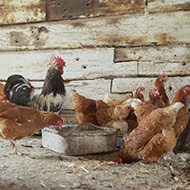
Restrictions to remain in place as chief vet reiterates call for biosecurity.
The UK's chief veterinary officer Christine Middlemiss has reiterated her call to all poultry keepers not to be complacent about avian flu and to continue to follow the urgent biosecurity measures to protect their flocks.
The UK is currently facing its largest-ever bird flu outbreak, with some 100 cases confirmed across the country since November 2021. To prevent the further spread of this disease, the Government introduced new housing regulations that make it a legal requirement to keep birds indoors and for them to follow strict biosecurity measures.
In a statement, updated to reflect the latest situation, Ms Middlemiss reminds poultry keepers that while the source of infection comes from migratory wild birds, ‘those failing to implement these measures risk infecting their own flocks by walking the virus into their holdings.’
The statement adds that keepers should continue to follow the strict biosecurity measures that are in place to limit the spread of and eradicate the disease.
“We have taken swift action to limit the spread of the disease, including introducing housing measures. However we are still seeing a number of bird flu cases both on commercial farms and in backyard birds right across the country,” Ms Middlemiss said.
“Many poultry keepers have excellent biosecurity standards but the number of cases we are seeing suggests that not enough is being done to keep bird flu out. Whether you keep just a few birds or thousands you must take action now to protect your birds from this highly infectious disease.
She added: “The avian flu outbreak has not gone away and implementing scrupulous biosecurity remains absolutely critical. You must continue to regularly clean and disinfect your footwear and clothes before entering enclosures, stop your birds mixing with any wild birds and only allow visitors that are strictly necessary.
"It is your actions that will help keep your birds safe.”



 The Animal and Plant Health Agency (APHA) has updated its online reporting service for dead wild birds.
The Animal and Plant Health Agency (APHA) has updated its online reporting service for dead wild birds.